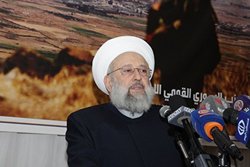 Shaykh Maher Hammoud called for a return to the language of logic and emphasized the preference for Lebanese national interests over individual interests.
Shaykh Maher Hammoud called for a return to the language of logic and emphasized the preference for Lebanese national interests over individual interests. RNA – In his Friday prayer sermon in the southern Lebanese city of Sidon, Shaykh Maher Hammoud, the chairman of the International Union of Resistance Scholars, criticized the claim that the escalating tensions and psychological wars of the enemies that have closed the minds and eyes of the people to the realities and said, “All parties to the conflict must return to the language of logic and prefer genuine national and universal interests.”
The Lebanese Sunni cleric also responded to the statement made by David M. Satterfield, the United States Ambassador to Turkey and the Acting Assistant Secretary of State for Near Eastern Affairs, that “if the Lebanese people are not satisfied with the Palestinian settlement, we will work for the displacement of the Palestinians,” saying that in successive meetings with Lebanese officials, all the American officials spoke in a threatening manner, especially in regard to the issue of the demarcation of the land and sea border between Lebanon and the Zionist entity in regard to extracting oil.
He added that the issue of the employment Palestinians and the events surrounding this issue resemble the sectarianism that existed in Lebanon before the 1975 to 1990 Lebanese Civil War in which all Christians were on one side and all Muslims on the other side.
Shaykh Hammoud warned of the repercussions of what is happening, especially as we hear disturbing comments and added, “We are not satisfied that the government employees in the country are 90 percent Muslim and 10 percent are Christian.”
Rasa News Agency
112/979